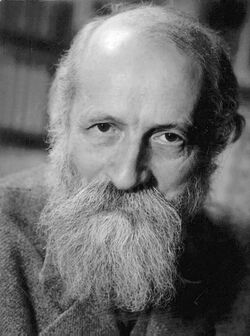Bairdism: Difference between revisions
mNo edit summary Tag: 2017 source edit |
mNo edit summary Tag: 2017 source edit |
||
| Line 2: | Line 2: | ||
<!-- the governing [[Communism in Carna|communist philosophy]] of [[Carna]]. --> | <!-- the governing [[Communism in Carna|communist philosophy]] of [[Carna]]. --> | ||
[[File:William Baird.jpg|thumb|250px|[[William Baird]], whose writings and philosophy formed the basis for Bairdism and set the stage for the [[Carnish Revolution]]]] | [[File:William Baird.jpg|thumb|250px|[[William Baird]], whose writings and philosophy formed the basis for Bairdism and set the stage for the [[Carnish Revolution]]]] | ||
Bairdism is a {{wp|List of communist ideologies|communist ideology}} developed by Carnish {{wp|Marxism|Marxist}} {{wp|political theorist}}, {{wp|philosopher}} and revolutionary [[William Baird]] that proposes the establishment of a {{wp|communism|communist society}} through the creation of {{wp|Democracy|democratic}} {{wp|Workers' council|people's councils}} organised under a {{wp|Decentralization|decentralised}}, {{wp|Non-partisan democracy|non-partisan}} union. Built around the theories of {{wp|Council communism|council communism}} and {{wp|Libertarian Marxism|libertarian Marxism}}, Bairdism is staunchly {{wp|Anti-authoritarianism|anti-authoritarian}} and democratic and is firmly opposed to {{wp|Leninism|Devinism}} and the concept of the revolutionary {{wp|vanguardism|vanguard party}}. Bairdism instead proposes that a network of worker councils would be the main vehicle for revolution against the {{wp|Capitalism|capitilist state}}. | Bairdism is a {{wp|List of communist ideologies|communist ideology}} developed by Carnish {{wp|Marxism|Marxist}} {{wp|political theorist}}, {{wp|philosopher}} and revolutionary [[William Baird]] that proposes the establishment of a {{wp|communism|communist society}} through the creation of {{wp|Democracy|democratic}} {{wp|Workers' council|people's councils}} organised under a {{wp|Decentralization|decentralised}}, {{wp|Non-partisan democracy|non-partisan}} union. Built around the theories of {{wp|Council communism|council communism}} and {{wp|Libertarian Marxism|libertarian Marxism}}, Bairdism is staunchly {{wp|Anti-authoritarianism|anti-authoritarian}}, {{wp|Anti-statism|anti-state}} and democratic and is firmly opposed to {{wp|Leninism|Devinism}} and the concept of the revolutionary {{wp|vanguardism|vanguard party}}. Bairdism instead proposes that a network of worker councils would be the main vehicle for revolution against the {{wp|Capitalism|capitilist state}}. Bairdism is also critical of {{wp|Reformism|reformist}} positions such as those held by {{wp|Social democracy|social democrats}}, believing that communists should not participate in bourgeois parliaments. | ||
Revision as of 12:37, 18 January 2021
| Part of a series on |
| Bairdism |
|---|
 |
|

Bairdism is a communist ideology developed by Carnish Marxist political theorist, philosopher and revolutionary William Baird that proposes the establishment of a communist society through the creation of democratic people's councils organised under a decentralised, non-partisan union. Built around the theories of council communism and libertarian Marxism, Bairdism is staunchly anti-authoritarian, anti-state and democratic and is firmly opposed to Devinism and the concept of the revolutionary vanguard party. Bairdism instead proposes that a network of worker councils would be the main vehicle for revolution against the capitilist state. Bairdism is also critical of reformist positions such as those held by social democrats, believing that communists should not participate in bourgeois parliaments.